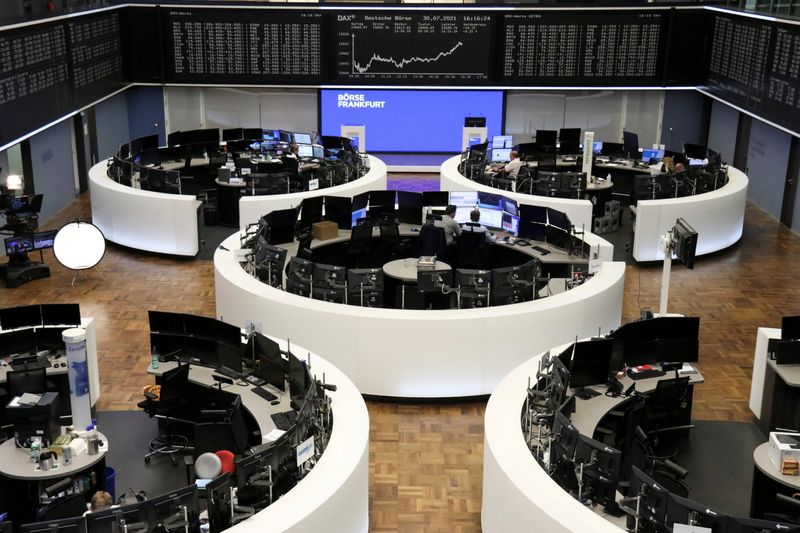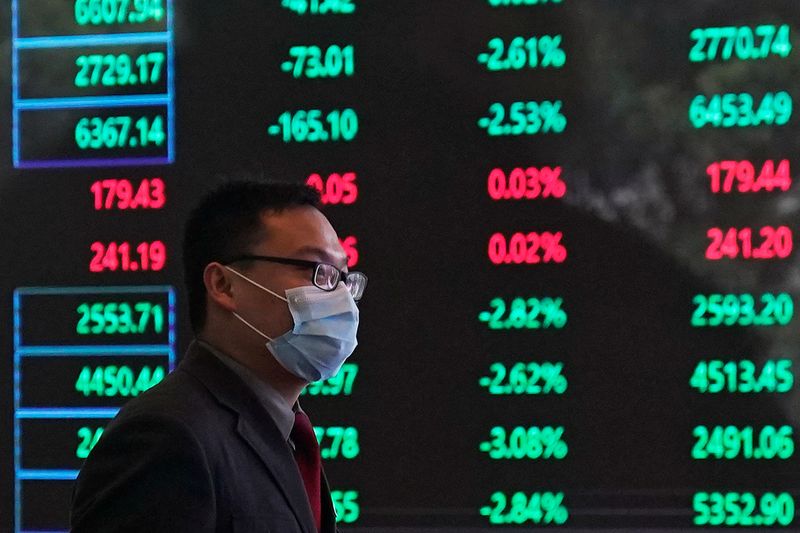By Lawrence Delevingne
BOSTON (Reuters) -U.S. stocks rose, 10-year Treasuries were flat and oil prices fell on Tuesday as markets weighed mixed signals from corporate earnings and economic growth data.
Wall Street's main stock indexes were choppy in morning trading but later turned positive, with notable gains from Apple Inc (NASDAQ:AAPL), Eli Lilly (NYSE:LLY) and Robinhood Markets Inc (NASDAQ:HOOD).
The S&P 500 gained 35.99 points, or 0.82%, to close at 4,423.15 - another record closing high - while the Dow Jones Industrial Average rose 278.24 points, or 0.8%, to 35,116.4, and the Nasdaq Composite added 80.23 points, or 0.55%, to 14,761.30.
"Today’s market action points to an acknowledgment that earnings are continuing to deliver all the way through," said Shannon Saccocia, chief investment officer at $17 billion wealth manager Boston Private.
Indeed, stronger-than-expected profit reports from U.S. companies in recent weeks have ratcheted up already high Wall Street forecasts on how second-quarter earnings growth will look versus last year.
Saccocia, however, said to expect more volatility later in August "when all that stands between investors and third-quarter earnings are a whole lot of Fedspeak, more masks and a flurry of mixed economic data."
Investors want to see July's U.S. non-farm payroll numbers, due on Friday, following dovish commentary from Fed Chief Jerome Powell last week.
A hint came in payroll data that indicates U.S. hiring slowed in July - rather than held steady, as widely expected - with particular softness among states that ended federal unemployment benefits and areas where the COVID-19 Delta variant is raging.
At the same time, new orders for U.S.-made goods increased more than expected in June, while business spending on equipment was solid, pointing to sustained strength in manufacturing even as spending is shifting from goods to services.
"The market is in a holding pattern and somewhat directionless, trying to sort out the tug of war between the delta variant and an economy ready to reach escape velocity," said Aaron Clark, portfolio manager at $56 billion GW&K Investment Management.
He said the market's focus is now on "how extreme any measures to control Delta spread might be." But he thinks the concern will pass "and the economy, earnings and stocks will resume their upward trajectory."
Traders left U.S. Treasury yields little changed as they awaited further indicators. The benchmark 10-year yield held at 1.1722% at the end of the trading day Tuesday, in line with the note's steady march down from this year's high yield of 1.776% reached March 30.
Oil settled lower in volatile trade as concern about rising cases of the Delta coronavirus variant outweighed expectations for another weekly draw in U.S. inventories that had boosted prices early in the session.
Brent crude oil futures settled down 48 cents, or 0.66%, at $72.41 a barrel. U.S. West Texas Intermediate crude settled down 70 cents, or 0.98%, at $70.56 a barrel.
Spot gold dropped 0.2% to $1,810.05 an ounce. U.S. gold futures fell 0.47% to $1,809.50 an ounce.

The U.S. dollar steadied after having lost value against the Japanese yen and Swiss franc as questions about slowing U.S. economic growth and the Delta variant challenged risk appetite.
The dollar index rose 0.037%, with the euro down 0.04% to $1.1862.
